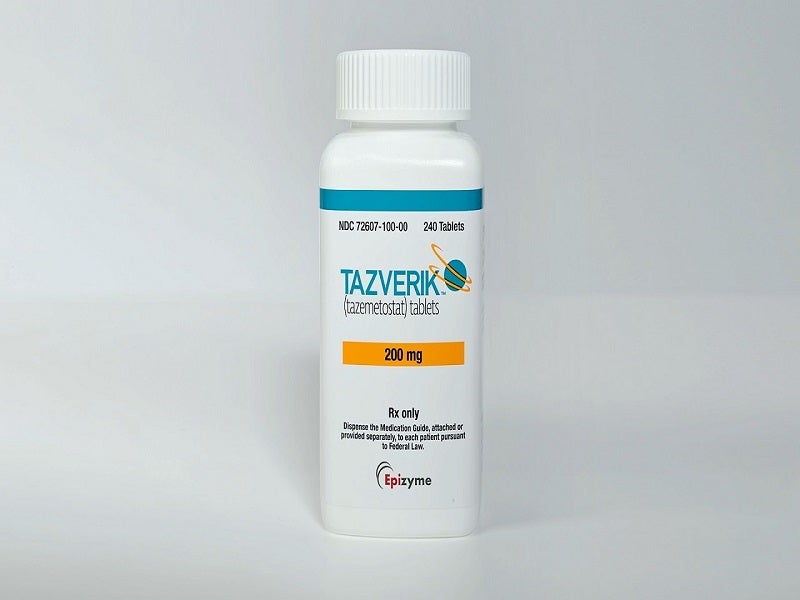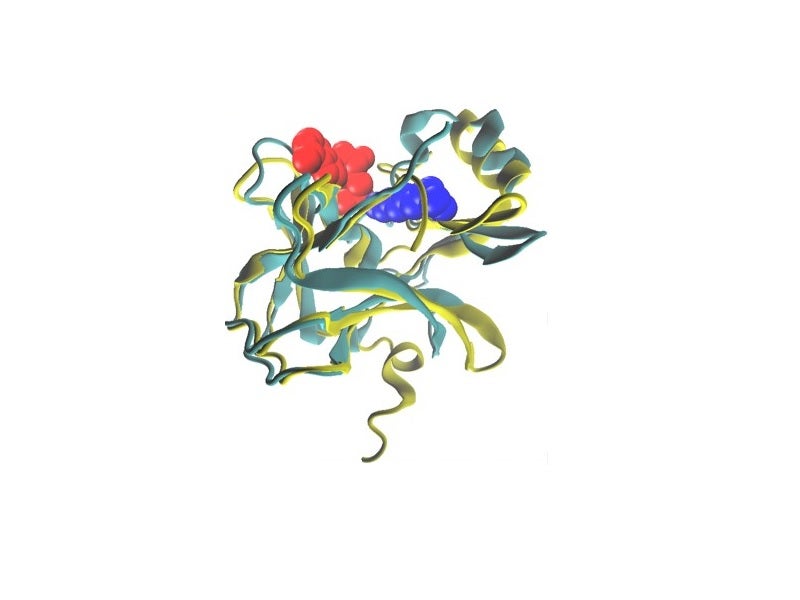Tazverik (tazemetostat) is a methyltransferase inhibitor of EZH2 indicated for the treatment of patients with epithelioid sarcoma and certain patients with follicular lymphoma (FL).
In May 2019, US-based biopharmaceutical company Epizyme submitted a new drug application (NDA) for tazemetostat to the US Food and Drug Administration (FDA). The drug was granted priority review status in July 2019 and received accelerated approval from the FDA in January 2020.
A supplemental NDA for Tazverik for the treatment of two distinct FL indications was approved in June 2020. Adult patients with EZH2 mutation-positive FL who have received at least two prior systemic therapies are eligible to receive the treatment, as are FL patients with no satisfactory alternative treatment options.
Epizyme holds worldwide development and commercialisation rights for tazemetostat except in Japan, where the rights are held by Japanese pharmaceutical company Eisai. Both companies hold licenses for royalties on sales outside their region.
In November 2019, Royalty Pharma, a company that acquires biopharmaceutical royalties, agreed with Eisai to buy the rights to receive royalties on the drug’s future global sales.
Epizyme chose oncology pharmacy service provider Onco360 Oncology Pharmacy as the exclusive speciality pharmacy partner for marketing Tazverik.
In August 2021, Epizyme and Hutchmed entered a partnership for research, development, manufacturing and commercialisation of Tazverik in Greater China, including mainland China, Hong Kong, Macau and Taiwan.
Tazverik has also received orphan drug designation. It is available as oral, twice daily film-coated, red, round, biconvex shaped tablets in 200mg strength.
Epithelioid sarcoma causes and symptoms
Epithelioid sarcoma is a rare, slow-growing soft tissue cancer, accounting for less than 1% of all soft tissue cancers. It originates as a painless small lump in the soft tissue of the hand, lower leg or forearm and can spread to other parts of the body. The disease is more common in men and young adults.
Epithelioid sarcoma is difficult to diagnose and has a high recurrence rate. As the tumour grows, sufferers can experience swelling and pain if the tumour presses on a nerve or muscle. Around 13,000 people are diagnosed with the disease a year, with an annual death rate of 5,100.
“More than 90% of patients with epithelioid sarcoma have a genetic mutation called loss of INI-1 gene function, which makes the patient responsive to tazemetostat.”
Tazemetostat’s mechanism of action
The small molecule tazemetostat inhibits EZH2 methyltransferase activity, which is highly expressed in the sarcoma cells and plays a crucial role in the cancer’s initiation and growth.
More than 90% of patients with epithelioid sarcoma have a genetic mutation called the loss of INI-1 gene function, which makes the patient responsive to tazemetostat.
Clinical studies on tazemetostat
The FDA’s approval of tazemetostat for advanced epithelioid sarcoma was based on results from EZH-202, a Phase II, open-label, single-arm, multi-centre clinical study in advanced epithelioid sarcoma patients.
A total of 250 patients were enrolled in EZH-202, with 62 patients in Cohort Five receiving 800mg Tazverik twice daily until disease headway or toxicity increased to an unacceptable level.
The primary goal of the study was to evaluate the overall response rate (ORR) and duration of response in patients every eight weeks.
The drug’s ORR was 15%, with 1.6% of patients demonstrating a complete response and 13% of patients showing a partial response. In around 67% of patients, the response lasted for six months or longer. The treatment was well-tolerated, with clinically significant and durable responses in patients.
Common adverse effects of the drug observed in patients during the study were pain, nausea, fatigue, vomiting, loss of appetite and constipation.
Other studies on tazemetostat
Tazemetostat is being evaluated in multiple clinical studies as a single-agent therapy, including Phase II clinical trials for relapsed or refractory non-Hodgkin lymphoma in patients with specified genetically defined solid tumours, assessed in paediatric patients for tumours such as synovial sarcoma and INI1-negative tumours.
Tazemetostat is being studied for the first-line treatment of diffuse large B-cell lymphoma (DLBCL) in patients with high risk, in combination with R-CHOP, a chemotherapy combination. The drug is being evaluated to treat relapsed or refractory diffuse large B-cell lymphoma (DLBCL) in combination with Tecentriq™ (atezolizumab).
Marketing commentary on Epizyme
Epizyme is a clinical-stage biopharmaceutical company engaged in the development of novel epigenetic therapies for cancer and other deadly diseases.
In addition to tazemetostat, the company currently has three new drug candidates and a set of preclinical candidates in its pipeline.
Epizyme is based in Cambridge, Massachusetts, and has more than 300 full-time employees.





